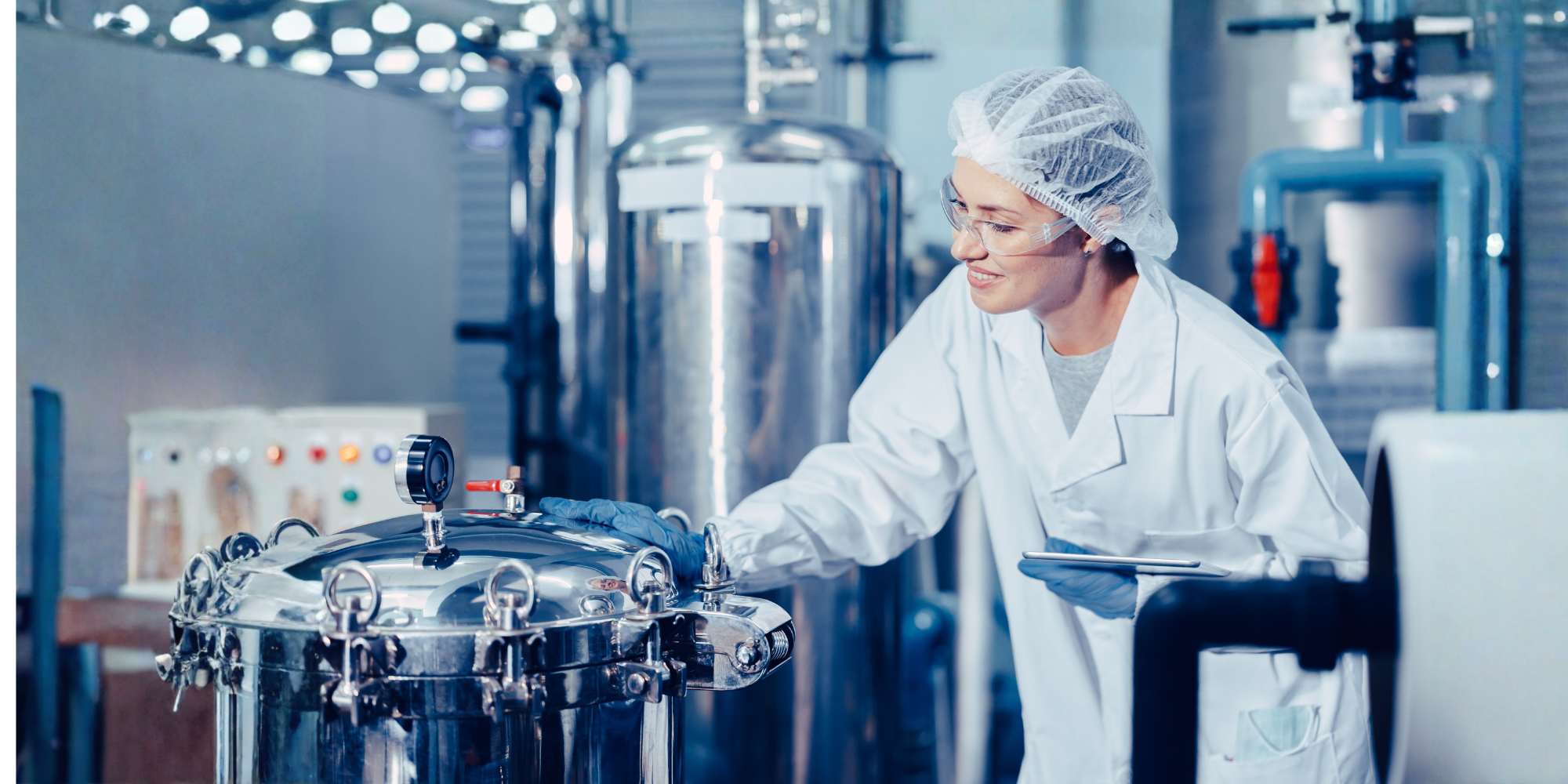The food and beverage manufacturing industry is very particular. Every process must meet strict regulations to keep consumers safe, and the work demands specialist knowledge across production, engineering, and quality control.
It takes real teamwork and focus to keep things moving – and behind it all are your people. With the right HR strategy, you can help support your people, keep production steady, and prepare for the future.
The importance of HR in the food and drink manufacturing industry
HR plays a strategic and indispensable role in the food and beverage manufacturing industry, serving as the backbone of workforce management and development. From hiring and training to retaining skilled employees, HR helps ensure teams are equipped to meet the unique demands of this fast-moving sector. A robust HR strategy can make all the difference in driving progress, productivity, and long-term success.
But, what does an effective HR strategy look like in practice? Let’s start with one of its most vital components – attracting and hiring the right people.
1. Recruitment and hiring processes
With ongoing shortages of qualified talent, a high demand for specialised skills, and seasonal fluctuations in staffing needs, the food and beverage manufacturing industry must adopt innovative recruitment strategies to attract potential employees and retain top talent, such as:
- Partnering with educational institutions to create pipelines of graduates who have industry-specific knowledge and skills.
- Developing apprenticeship programs to provide hands-on training and attract young professionals interested in pursuing a career in the food and beverage manufacturing sector.
- Investing in a recruitment software designed for food and drink manufacturers. A software that not only assists in recruiting large volumes of candidates with specialised skills, but also stores previous employees who have worked on flexible contracts – allowing you to easily contact them if there are short-term staffing issues.
2. Efficient employee scheduling
In a 24-hour production environment, efficient scheduling is essential. HR plays a key role in keeping operations running smoothly – ensuring the right number of people are in place to meet demand, maintain safety, and keep productivity high, all while optimising labour costs.
But effective scheduling goes beyond simply having enough employees on the floor. It should also account for employee preferences, skills, and availability – and use data-driven insights to anticipate staffing needs. Accurate labour forecasting helps HR teams schedule smarter. By combining historical trends, real-time data, and predictive analytics, forecasting brings foresight and flexibility to staffing decisions, boosting efficiency while protecting profitability.
3. Managing complex work patterns
In the food and drink manufacturing industry, employees may be required to work long hours, night shifts, and even weekends. By introducing flexible work arrangements and enabling easy shift swaps through your HR and Workforce Management platform, teams can balance personal commitments while maintaining productivity.
Meanwhile, prioritising wellness initiatives and providing tools to manage stress can help employees stay engaged and energised. And by giving employees a say in their schedules – through submitting availability digitally and swapping shifts when their availability changes – you can foster a culture of flexibility and autonomy.
4. Employee retention
Retaining skilled employees is just as important as attracting them. In the fast-paced food and drink manufacturing industry, a strong retention strategy helps keep teams motivated – building a stable, high-performing workforce for the long-term. Some effective ways to boost retention include:
- Providing competitive compensation packages that include benefits such as healthcare, retirement plans, and bonuses.
- Offering opportunities for career progression through training, development programs, and internal promotions.
- Conducting regular employee engagement surveys to gather feedback on improvements that can be made in the workplace.
- Introducing effective rewards and recognition programs to acknowledge employee contributions and boost morale.
- Supporting financial wellbeing through initiatives like early access to earned wages, financial education, and personalised guidance to reduce stress and build confidence.
5. Ensuring accurate payroll
Paying your employees accurately and on time is crucial in any industry. However, in the food and drink manufacturing sector, where multiple pay rates, shift differentials, and overtime calculations are involved, managing payroll can be particularly tricky – and accuracy is essential for keeping teams happy and engaged.
To achieve this, employers should focus on putting the right systems and processes in place:
- Invest in a reliable pay software that can handle complex pay calculations and ensure pay accuracy.
- Ensure proper record keeping of all employee hours and wages to avoid disputes. This can be made easy with geo-tagging and geo-fencing employee clock-in and out records.
- Empower employees with an AI HR assistant, such as ELLA, to explain their pay, understand, and report any discrepancies.
For many organisations, this is where AI-enabled tools like ZellisONE Pay add real value. Its continuous recalculation and real-time anomaly detection help ensure accuracy and transparency, while smart payroll dashboards give HR teams the insight to identify and resolve issues early.
Unlimit your payroll precision with ZellisONE Pay
6. Compliance requirements
Adhering to various standards and regulations is a critical HR responsibility in an industry where food safety and quality are paramount. From UK food safety regulations, such as the Food Safety Act 1990 and the Food Hygiene Regulations 2006, to employment laws, like the Working Time Regulations and Equality Act 2010, HR must ensure that the company complies with all legal requirements. This involves conducting regular audits, providing training to employees and managers on compliance regulations, and having proper documentation in place.
To manage this effectively, compliance information needs to live in one unified, single source of truth – a platform where documents can be created, sent, signed, actioned, and stored securely. That’s where ZellisONE comes in.
Our software is designed to simplify compliance management from end-to-end. With a powerful payroll engine that conducts over a thousand automated checks, ZellisONE reduces errors and rework before payroll deadlines. It also supports high-volume, high-precision pay runs with built-in validations and legislative compliance across the UK, Republic of Ireland, Isle of Man, Jersey, and Guernsey – helping you stay compliant, confident, and audit-ready at all times.
7. Training and development
On the note of adhering to compliance requirements, you can’t afford to put training on the back burner. Developing comprehensive programs for food and drink safety, handling, and preparation is essential.
Make sure that your employees’ training records are in one place and can be accessed quickly. This helps ensure that all employees are up-to-date with their training requirements. Integrating these records with your workforce planning tools will also safeguard you and your business from scheduling employees with expired training qualifications.
8. Workplace safety
This brings us to the final point on workplace safety. Yes, we need rigorous sanitisation protocols and health checks to protect our workers from the risk of illness, but workplace safety also involves creating a culture of safety.
Consider collaborating with managers to identify any potential hazards and implement safety procedures. Send out a survey via your HR software to understand the current state of workplace safety and get feedback from employees on improvements that can be made. Regularly review and update your safety policies, conduct training sessions, and have a system in place for reporting any incidents or hazards. This should all be undertaken in one platform to allow consistent monitoring and tracking.
What does the future look like?
With advancements in technology and AI, HR professionals in the food and beverage manufacturing industry can look forward to more efficient processes and increased productivity.
The future of human resource management is digital and data-driven. With the right HR, Workforce Management and Pay platform, you can automate tasks, access real-time data and analytics, and make informed decisions. This will not only streamline operations but also enable HR to focus on developing strategies for employee engagement and retention.
How Zellis can help
Your employees are your most valuable asset, and it is essential to prioritise their safety and wellbeing in the workplace. By effectively managing complex work patterns, providing opportunities for growth and development, ensuring accurate payroll, and complying with legal requirements, you can create a positive work environment for your employees.
Zellis offers configurable and scalable HR, Workforce Management and Pay solutions designed for the food and beverage manufacturing industry. With features such as workforce planning, time and attendance tracking, compliance management, and employee self-service tools, Zellis can help streamline your HR and pay processes and drive better business results.
The tools to empower. The tools to transform. The tools to unlimit
Enable your people and your organisation to be the best version of themselves.








